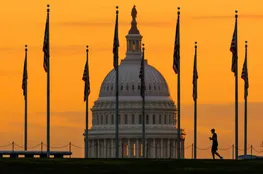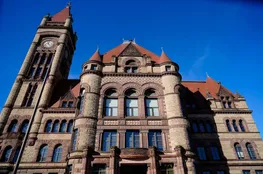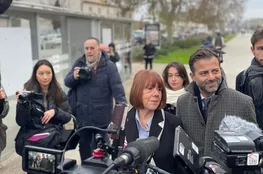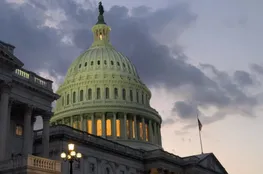Expanding insurance coverage for critical medical procedures, allocating $133 million for attainable housing and instituting accountability for Nevada schools are among some of the biggest legislative policy proposals that are now law. The 2025 Legislature concluded at the beginning of June, and Gov. Joe Lombardo had 10 days to take action on the bills the Legislature passed. He ultimately signed 518 bills out of the 605 that he received, but he made history with his record-setting vetoes . “I am proud of the meaningful progress we made this session — particularly in the areas of education and housing,” Lombardo said in a Friday statement. “Working together, we’ve taken important steps to expand educational opportunity, begin restoring accountability in our public schools, and make housing more attainable for working families across our state.” Here’s a rundown of the new laws to come out of the 2025 Legislature — and the biggest issues they aim to fix.
Though Lombardo highlighted education and housing as major areas of progress, UNLV Political Scientist David Damore thinks health care was perhaps the biggest theme this session. “Every governor wants to be the education governor, but I think if he wants to or not, Lombardo’s becoming the health care governor,” Damore said. Despite the governor’s critical health care reform bill dying in the Legislature, there were many bills that went beyond what the governor introduced, Damore said. “I think that there was just some collective realization that we need to up our game in the health care space,” he said. For instance, Nevadans will now see a $35 cap on the cost of insulin for those on private insurance, expanding a national law that previously only applied to Medicare beneficiaries. Changes were also made to what all is covered under insurance. New laws require health insurers — in some cases both public and private — to cover screenings for genetic disorders in a fetus, fertility preservation procedures for Nevadans diagnosed with breast or ovarian cancer whose treatment may affect their fertility, and screenings for lung cancer . Nevadans experiencing homelessness will receive more coverage under Medicaid for respite care, including behavioral health services, food and housing services, medication storage and management, transportation to medical appointments and acute and post-acute medical care. Women can also obtain OB-GYN services covered by their insurance without needing a referral from their primary care physician, and they can also designate their OB-GYN as their primary care physician. Another new law, Senate Bill 188 , requires health care facilities that provide care under Medicaid to provide language assistance to a patient who speaks limited English with language assistance. The assistance must be free, accurate and protect the patient’s privacy. Lawmakers attempted to curb the doctor shortage by implementing a law prohibiting medical institutions that receive funds from the Graduate Medical Education Grant Program from eliminating or reducing the size of a program for residency training and postdoctoral fellowships without the approval of the Department of Health and Human Services. The governor was successful in his proposal to split the Department of Health and Human Services into the Department of Human Services and the Nevada Health Authority, which will serve as the single state agency to deal with regulating, purchasing and paying for health care services for Nevadans. The split aims to improve services and overall health outcomes, according to policymakers.
Major bipartisan efforts were made to address the state’s longstanding housing crisis , brought on by elevated interest rates, a slowdown in building, a lack of buildable land and increased construction and labor costs. Nevada will direct $133 million toward housing projects, thanks to the governor’s Nevada Housing Access and Attainability Act . More people will qualify for affordable housing after the definition was expanded to allow it to benefit people with up to 150 percent of area median household income, or incomes up to $106,000 in Clark County, according to 2023 Census data. Clark County will receive $15 million from the state for eviction diversion programs, thanks to a new law put forward by Democratic Aseemblelymember Daniele Monroe-Moreno. Another new law , sponsored by Democratic Aseemblemyber Sandra Jauregui, requires county and city governing bodies to adopt an ordinance to allow someone to apply for a permit to build housing on property zoned for commercial use. Landlords will no longer be able to charge a tenant a fee to make a payment through an online portal or website, thanks to the passage of AB 121 , which prohibits junk fees from corporate landlords when paying rent. In an effort to keep more animal lovers in their homes, SB 166 prevents insurers from refusing to issue or cancel a policy because the residence has a specific dog breed or dog breed mix for rental properties. It also allows residents of public housing to keep at least one pet. “Allowing pets in public housing removes a significant barrier to housing for Nevada families,” said state Sen. Melanie Scheible, D-Las Vegas, in a statement.
The legislative session ushered forward major changes for the state’s education system. Legislators passed a $12.9 billion education budget that includes $250 million for maintaining educator pay raises, a new law providing $17 million for transporting students to charter schools and landmark bipartisan legislation setting up a new system of accountability for school districts. The major education reform law, which merged priorities of Senate Majority Leader Nicole Cannizzaro and Lombardo, includes ratings for low-performing school districts and a pathway for state intervention for continued underperformance. It also expands open enrollment and pre-kindergarten programs to the extent money is available. Clark County School District Superintendent Jhone Ebert said the district appreciates the support policymakers demonstrated through the session. “As educators, we welcome accountability from the CCSD community and remain committed to providing every student with the tools for success,” she said in a Thursday statement.
Multiple bills sought to drastically change the way Nevada conducts its elections and were ultimately unsuccessful, including legislation to implement voter ID and allow nonpartisan voters to participate in a party primary of their choice. Still, other election-related bills made it through the finish line. Voters will now receive their sample ballots before their mail ballots, which had been a problem in the 2024 election and caused voter confusion. County and city clerks will be required to recruit election board officers for a polling place established within the boundaries of a tribal reservation. Changes to campaigning were also implemented. Under AB 73 , campaign communications such as advertisements in support or opposition of a candidate must disclose whether it was made using artificial intelligence. The bill was one of Secretary of State Cisco Aguilar’s legislative priorities . Under AB 123 , a person is prohibited from making threats to or intimidating a candidate for public office. Someone who violates the law will be guilty of a misdemeanor on their first offense and a gross misdemeanor on a subsequent offense.
Though some bills to implement automated traffic enforcement systems failed this session , other bills aiming to improve traffic safety were made into law, including a bill appropriating over $18 million from State Highway Fund to the Nevada Highway Patrol Division of the Department of Public Safety for vehicles and equipment. AB 527 allows school districts to install cameras on school buses to enforce vehicle stops for school buses. The cameras will catch drivers who fail to stop when a school bus is stopped to drop off or pick up a student and its lights are flashing. Traffic enforcement officers will review the footage from the camera before issuing a civil infraction citation. AB 111 , put forward by Republican Aseemblemyber Brian Hibbetts, makes wrong-way driving on a divided highway a misdemeanor rather than a civil infraction, aiming to curb the large number of roadway fatalities that occur every year.
























